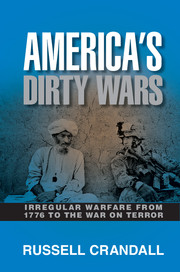Book contents
- Frontmatter
- Dedication
- Contents
- List of Figures
- Acknowledgments
- 1 Introduction
- 2 Irregular Warfare 101
- Part One The American Revolution to Chasing Sandino, 1776–1930s
- Part Two The Cold War, 1940s–1989
- Part Three Latin America and the Cold War, 1950s–1980s
- Part Four Post–Cold War, 1990s–2000s
- 26 Dirty Wars after the Cold War
- 27 Colombia
- 28 Iraq
- 29 Intermezzo
- 30 Post-9/11 COIN in the Philippines
- 31 Intermezzo
- 32 The Longest War
- 33 The Fall of Muammar Qaddafi, 2011
- 34 Intermezzo
- 35 Conclusion
- Epilogue “I Feel More Like a Monster”
- Notes
- Bibliography
- Index
34 - Intermezzo
JSOC Raids and Drone Strikes
Published online by Cambridge University Press: 05 July 2014
- Frontmatter
- Dedication
- Contents
- List of Figures
- Acknowledgments
- 1 Introduction
- 2 Irregular Warfare 101
- Part One The American Revolution to Chasing Sandino, 1776–1930s
- Part Two The Cold War, 1940s–1989
- Part Three Latin America and the Cold War, 1950s–1980s
- Part Four Post–Cold War, 1990s–2000s
- 26 Dirty Wars after the Cold War
- 27 Colombia
- 28 Iraq
- 29 Intermezzo
- 30 Post-9/11 COIN in the Philippines
- 31 Intermezzo
- 32 The Longest War
- 33 The Fall of Muammar Qaddafi, 2011
- 34 Intermezzo
- 35 Conclusion
- Epilogue “I Feel More Like a Monster”
- Notes
- Bibliography
- Index
Summary
In Iraq, when we first started [special operations missions], the question was “Where is the enemy?” That was the intelligence question. As we got smarter, we started to ask, “Who is the enemy?” And we thought we were pretty clever. And then we realized that wasn’t the right question, and we asked “What’s the enemy trying to do?” And it wasn’t until we got further along that we said, “Why are they the enemy?”
– General Stanley McChrystal, interviewed in 2013On the morning of November 4, 1979, enraged Iranian student protestors began scaling the brick walls of the U.S. embassy compound on Takht-e-Jamshid Avenue in Tehran. Iranian security officials positioned to protect the compound did nothing to block the entering mob. The protestors thus seized the embassy and held hostage more than fifty Americans. The radical university students, including the future president Mahmoud Ahmadinejad, were motivated by a desire to strike a blow against the “Great Satan,” but also to help push aside the secular moderate elements who were competing for power since the pro-American shah of shahs, Mohammad Raza Pahlavi, had been ousted earlier in the year. As the blindfolded Americans were led out of the chancery building, a jubilant crowd shouted, God is Great! and Death to America!
Over the next several months, American diplomats failed to secure the release of their compatriots, who would not be freed until January 20, 1981, 444 days after their capture and the day that President Jimmy Carter left office and Ronald Reagan was inaugurated. At the same time as the seemingly fruitless talks continued, American military planners hatched a rescue mission code-named Eagle Claw that would use the newly created elite counterterrorism unit, the 1st Special Forces Operational Detachment-Delta, or simply Delta Force. Intense training and planning ensued in the United States, Egypt, and Oman to get the mission ready for action.
- Type
- Chapter
- Information
- America's Dirty WarsIrregular Warfare from 1776 to the War on Terror, pp. 457 - 466Publisher: Cambridge University PressPrint publication year: 2014



